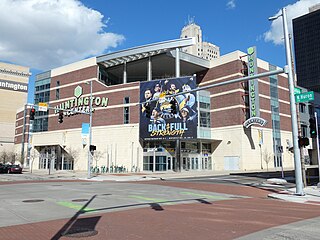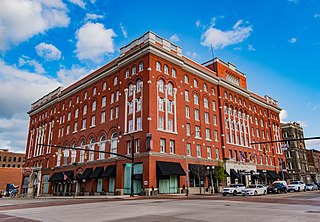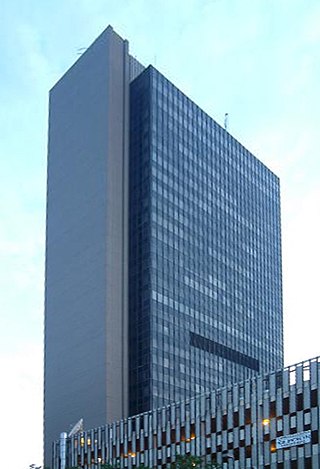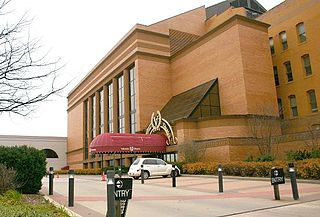
Toledo is a city in and the county seat of Lucas County, Ohio, United States. A major Midwestern United States port city, Toledo is the fourth-most populous city in the state of Ohio, after Columbus, Cleveland, and Cincinnati, and according to the 2020 census, the 79th-largest city in the United States. With a population of 270,871, it is the principal city of the Toledo metropolitan area. It also serves as a major trade center for the Midwest; its port is the fifth-busiest in the Great Lakes and 54th-biggest in the United States. The city was founded in 1833 on the west bank of the Maumee River, and originally incorporated as part of Monroe County, Michigan Territory. It was refounded in 1837, after the conclusion of the Toledo War, when it was incorporated in Ohio.

Playhouse Square is a theater district in downtown Cleveland, Ohio, United States. It is the largest performing arts center in the US outside of New York City. Constructed in a span of 19 months in the early 1920s, the theaters were subsequently closed down, but were revived through a grassroots effort. Their renovation and reopening helped usher in a new era of downtown revitalization in Cleveland, and was called "one of the top ten successes in Cleveland history."

Downtown Cleveland is the central business district of Cleveland, Ohio. The economic and symbolic center of the city and the Cleveland-Akron-Canton, OH Combined Statistical Area, it is Cleveland's oldest district, with its Public Square laid out by city founder General Moses Cleaveland in 1796.

Central Catholic High School, is a Catholic, co-educational, college prep secondary school in Toledo, Ohio. It is operated by the Roman Catholic Diocese of Toledo and is the largest Catholic high school in the area. CCHS was founded as Cathedral High School in 1919, with its name change in 1920. The school, which is located one mile northwest of Downtown Toledo, offers two possible degrees: honors or college prep. It has received two School of Excellence Awards and the Drug Prevention Award.

Saenger Theatre is an atmospheric theatre in downtown New Orleans, Louisiana, which is on the National Register of Historic Places. Once the flagship of Julian and Abe Saenger's theatre empire, today it is one of only a handful of Saenger movie palaces that remain.

Edward Drummond Libbey High School was a public high school building located on the south side of Toledo, Ohio which held classes from 1923 until 2010. It is part of Toledo Public Schools and contained the Smart Academy and Humanities Academy. Libbey was named after Edward Drummond Libbey, the founder of the Toledo Art Museum and Libbey Glass. David L. Stine was the building's architect.

The Mimi Ohio Theatre is a theater on Euclid Avenue in downtown Cleveland, Ohio, part of Playhouse Square. The theater was built by Marcus Loew's Loew's Ohio Theatres company. It was designed by Thomas W. Lamb in the Italian Renaissance style, and was intended to present legitimate plays. The theater opened on February 14, 1921, with 1,338 seats. The foyer featured three murals depicting the story of Venus, and the balcony contained paintings of Arcadia. Throughout the 1920s, the Ohio had a stock company and hosted traveling Broadway plays.

The Huntington Center is an 8,000-seat multi-purpose arena in downtown Toledo, Ohio. It was completed in 2009 and cost $105 million to build. It replaced the Toledo Sports Arena, which has since been demolished.

The Madam C. J. Walker Building, which houses the Madam Walker Legacy Center, was built in 1927 in the city of Indianapolis, in the U.S. state of Indiana, and as Madam C. J. Walker Manufacturing Company, it was designated a National Historic Landmark in 1991. The four-story, multi-purpose Walker Building was named in honor of Madam C. J. Walker, the African American hair care and beauty products entrepreneur who founded the Madam C. J. Walker Manufacturing Company, and designed by the Indianapolis architectural firm of Rubush & Hunter. The building served as the world headquarters for Walker's company, as well as entertainment, business, and commercial hub along Indiana Avenue for the city's African American community from the 1920s to the 1950s. The historic gathering place and venue for community events and arts and cultural programs were saved from demolition in the 1970s. The restored building, which includes African, Egyptian, and Moorish designs, is one of the few remaining African-Art Deco buildings in the United States. The Walker Building was added to the National Register of Historic Places in 1980.

The Power Building is a historic commercial building in the downtown of Cincinnati, Ohio, United States.

The Great Southern Hotel & Theatre is an historic hotel and theater building in Downtown Columbus, Ohio. The building currently operates as the Westin Great Southern Columbus and the Southern Theatre.

Tower on the Maumee is a skyscraper at 200 North Saint Clair Street in Toledo, Ohio. Constructed in 1969, the 400 feet (120 m) building is an example of the international style of architecture. In 2012, the building was listed on the National Register of Historic Places under the name "Riverview".
Downtown Toledo is the central business district of Toledo, Ohio. Both the Warehouse District and the area surrounding the Huntington Center have been areas of recent growth.
Many Neighborhoods of Toledo, Ohio are of historic interest.

Hillcrest Hotel, also known as the Hillcrest Arms Apartment Hotel, is a historic building in Toledo, Ohio, United States. It has nine floors and was listed on the National Register of Historic Places in 1998. It is located at 1601-1621 Madison Avenue.

The Pythian Castle in Toledo, Ohio, is a Romanesque-style building built in 1890. Located in Toledo's Center City at the corner of Jefferson Avenue and N. Ontario Street, it was listed on the National Register of Historic Places in 1972.

The Mississippi Lofts and Adler Theatre is an apartment building and theater complex located in downtown Davenport, Iowa, United States. It is individually listed on the National Register of Historic Places by its original name, the Hotel Mississippi and RKO Orpheum Theater. The Hotel Mississippi was listed on the Davenport Register of Historic Properties in 2005. In 2020 the complex was included as a contributing property in the Davenport Downtown Commercial Historic District.

The Burtis–Kimball House Hotel and the Burtis Opera House were located in downtown Davenport, Iowa, United States. The hotel was listed on the National Register of Historic Places in 1979. It has since been torn down and it was delisted from the National Register in 2008. The theatre building has been significantly altered since a fire in the 1920s. Both, however, remain important to the history of the city of Davenport.

The Toledo Opera is an American opera company in Toledo, Ohio, performing in the Valentine Theatre in downtown Toledo. The company's season consists of three fully-realized operas, plus additional community programming for the Northwest Ohio region.

Mills, Rhines, Bellman & Nordhoff was an architectural firm founded in Toledo, Ohio in 1912. Renamed Bellman, Gillett & Richards in 1944, Richards, Bauer & Moorhead in 1962 and Bauer, Stark & Lashbrook in 1979, it closed in 1999.



















